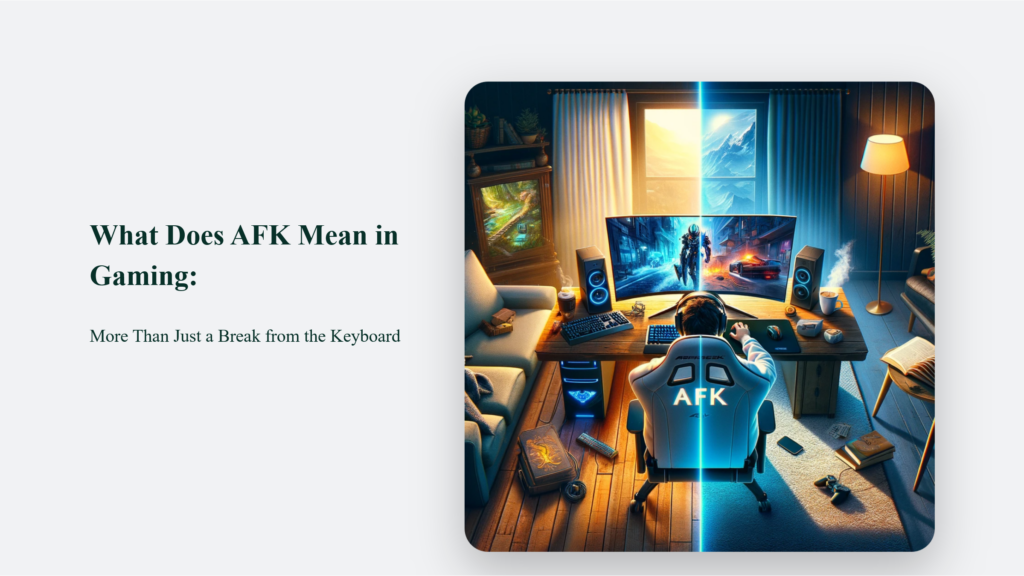Going AFK is a common occurrence in online gaming. But what does AFK mean in gaming, and when do gamers use this term? This article will explore the AFK acronym in depth.

What does AFK mean in Gaming?
AFK stands for “away from keyboard.” It is used when a gamer stops playing or interacting with an online game temporarily.
Some common reasons gamers go AFK include:
- Needing a bathroom or snack break
- Answering the door or phone
- Letting the dog out
- Dealing with family members or roommates
Essentially, AFK signals that you have temporarily stepped away from the game and that other players should not expect responses or interactions from you during that time.
Why Do Gamers Go AFK?
There are many legitimate reasons gamers suddenly go AFK during an online gaming session:
- Bodily functions – As humans, gamers need bathroom and snack breaks. Staring at a screen for hours on end can be taxing.
- Real-life interruptions – Significant others, such as parents, children, roommates, etc., may interrupt gameplay. Issues like answering the door or an important phone call take priority.
- Technical difficulties – Sometimes internet connections drop, or computers crash unexpectedly. It forces an abrupt AFK status.
- Emergencies – Genuine emergencies, such as a fire alarm or sick family members, can force gamers to go AFK without warning.
While annoying, most gamers understand needing to go AFK unexpectedly. We all have real lives and responsibilities outside of gaming that pop up.
However, gamers going AFK too frequently or for excessively long periods during team games can understandably frustrate teammates, especially if it hurts the team’s chances of winning.
AFK vs Idling or Leeching
There are differences between going AFK briefly due to real-life needs and leaving your character idling or leeching:
AFK
- Temporarily stepping away from the game
- Usually lasts a few minutes up to an hour or so
- Intending to return and continue playing
- Unavoidable due to real-life interruptions
Idling
- The character remains active in game when player leaves
- Staying away for extended periods of time
- No intention of returning soon
- Usually done to avoid log-off timers
Leeching
- Remaining AFK in team games to benefit from others’ efforts
- Earning rewards and progression from team victories without contributing
- Considered parasitic gameplay by serious gamers
Most gamers don’t mind others going AFK briefly as needed. But idling and leeching are often frowned upon, especially in cooperative team games.
Common AFK Messages
When stepping away, it’s gaming etiquette to let your team know you’ll be AFK. This is typically done by using preset chat messages.
Common AFK messages include:
- “Be right back” (BRB)
- “Sorry, AFK”
- “Need a quick break”
- “Phone call, AFK”
- “Dog duty calls! AFK”
- “Bio break, AFK”
These inform teammates that you had to step away so they’re not left wondering. If you can, provide an ETA for when you expect to return from being AFK.
AFK Detection and Penalties
Most online games have AFK detection systems these days. If your character idles or is unresponsive for too long, the game may log you out or penalize you.
Common AFK penalties include:
- Getting 0 rewards/progress for a team win
- Temporary bans from online play
- Character death or loss of assets/property
- Removal from team activities
These deter players from idling or leeching instead of contributing. They incentivize participating actively so your team can handle being short members.
Frequently Asked Questions:
Can I get banned for going AFK in online games?
Most games allow brief AFK periods as needed. But idling for too long may incur penalties like bans, especially in ranked/competitive play.
Is it rude to go AFK during multi-player games?
Temporarily going AFK for real-life reasons is fine. But inform your team and don’t idle for excessively long periods of time.
What if I go AFK unintentionally due to internet/tech issues?
Unplanned AFK due to technical difficulties happens to all gamers occasionally. Just rejoin as soon as you can and let your team know what occurred.
Summarizing What AFK Means in Gaming
Going AFK means temporarily stepping away from the game and keyboard due to real-life interruptions. Gamers use AFK to notify teams that they’ve had to pause participating but intend to return.
Being AFK for short breaks as needed is fine. But idling for excessively long periods or intentionally leeching team efforts is frowned upon.
Understanding what AFK means helps gamers use it appropriately and respectfully during online play. With awareness and effective communication, brief AFK status doesn’t need to disrupt the gaming experience.
Hopefully, you will understand what AFK means the next time a teammate says, “AFK, dog puked on the rug!”


![The ‘Giveaway Piggy Back Scam’ In Full Swing [2022]](https://www.cjco.com.au/wp-content/uploads/pexels-nataliya-vaitkevich-7172791-1-scaled-2-683x1024.jpg)

